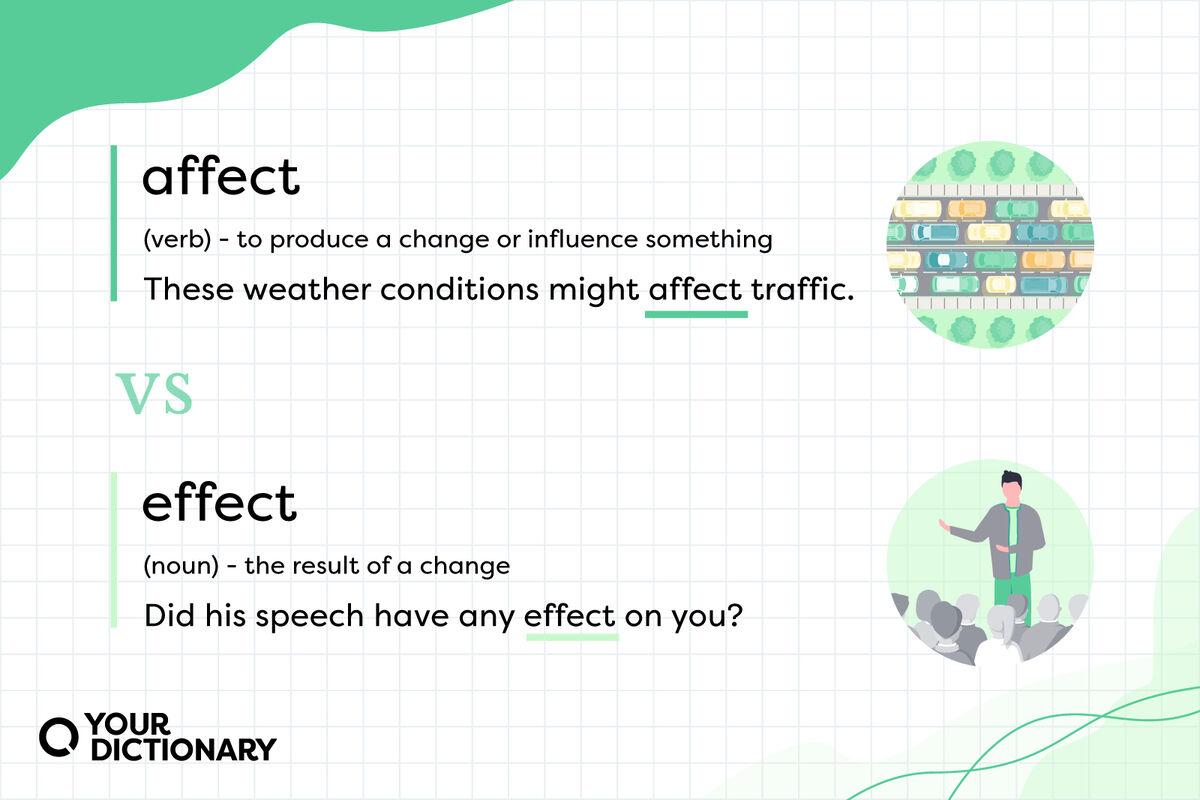
Let’s get real: Are affect and effect actually different words? After all, they’re spelled and pronounced similarly, and you can use each of them as a noun and a verb (calm down, we’ll explain in a second). So how do you tell them apart?
The Key Difference Between "Affect" and "Effect"
The main difference between the homophones affect and effect is their main part of speech.
Although both words have less common definitions and usages, these are their primary meanings.
You’re most likely to see the verb affect, meaning “to make a change,” and the noun effect, meaning “the thing that happens after a change.”
“Affect” Is a Verb Meaning “To Change”
You’re most likely to see affect functioning as a verb. It refers to the action of influencing or changing something.
- How does the economy affect unemployment?
- These weather conditions might affect traffic.
- Smoking cigarettes can adversely affect your lungs and blood flow.
- An early frost in Florida can affect the orange crop.
- Not winning didn't affect her as much as I thought it would.
- Doing extra credit can positively affect your grade.
“Effect” Is a Noun Meaning “A Result”
When you see the word effect, it’s probably functioning as a noun meaning “what happened after an action.” You may also see it in the phrase side effect, which refers to another result in addition to the intended result of an action.
- What effect did the loss have on the team?
- Did his speech have any effect on you?
- The prescribed medication has a few side effects.
- Seeing a film about car crashes had an effect on the teenagers.
- News broadcasts can have a huge effect on public opinion.
- A good night's sleep has a positive effect on your day.
- An unexpected effect of her promotion was her colleagues’ jealousy.
Examples of "Affect" vs. "Effect" in Sentences
If your sentence looks or sounds odd with affect or effect in it, don’t worry — rephrasing is quite easy. Just make sure you’re using affect as a verb and effect as a noun.
- Micah’s rude behavior negatively affected his reputation.
- Micah’s rude behavior had a negative effect on his reputation.
- Emotional movies really affect me.
- Emotional movies really have an effect on me.
- Your opinions don’t affect my decision to move abroad.
- Your opinions don’t have an effect on my decision to move abroad.
Quick Tip
- Affect begins with an “a,” just like action — and affect is typically an action.
- Effect begins with an “e,” just like end result — and effect is an end result.
Exceptions: Other Meanings of "Affect" and "Effect"
Affect and effect have different definitions and parts of speech — most of the time. There are some rare occurrences when each word has a different meaning, and those usages can trip us up more often than we think.
“Effect” Can Also Mean “To Make Happen”
Rarely, effect can function as a verb to mean “to make something happen, or to bring about.” You’ll usually see this usage in formal or academic writing.
- The president sought to effect collaboration in her administration.
- Our goal is to effect improvements in our community’s infrastructure.
“Affect” Can Also Mean “Display of Emotion”
Less commonly, affect functions as a noun in one particular situation: when referring to a display of emotion (usually a very low amount of emotion). This usage is more common in psychology and medical fields, so you’re not likely to see it as often. It’s pronounced “AH-fect,” not “ah-FECT” in this case.
- The young man had a flat affect as he told the story without emotion.
- Sharon took the news of her husband's death with a devastated affect.
“Affect” vs. “Effect” in Common Phrases
Since affect and effect can function as both verbs and nouns (we know, it’s confusing), choosing between them in common phrases can get tricky. So which one is which?
Is It “Effect Change” or “Affect Change”?
Effect as a verb usually appears in the phrase to effect change, meaning “to cause change.” If it were to affect change, you’d just be changing the change, not causing the change.
- As senator, I promise to effect change in our government.
- The new manager is bound to effect positive changes in the office.
Does Something Go “Into Effect” or “Into Affect”?
Similarly, effect is the proper word to use in the phrase go into effect. You’re using effect as a noun in this context to mean “to officially begin.”
- The new law goes into effect at midnight.
- These changes to the school dress code go into effect on Monday.
Is It “Take Effect” or “Take Affect”?
Another phrase that means “to begin to apply” is take effect (not take affect).
- My new medication takes effect about an hour after I take it.
- Do you think the rules have taken effect in your company?